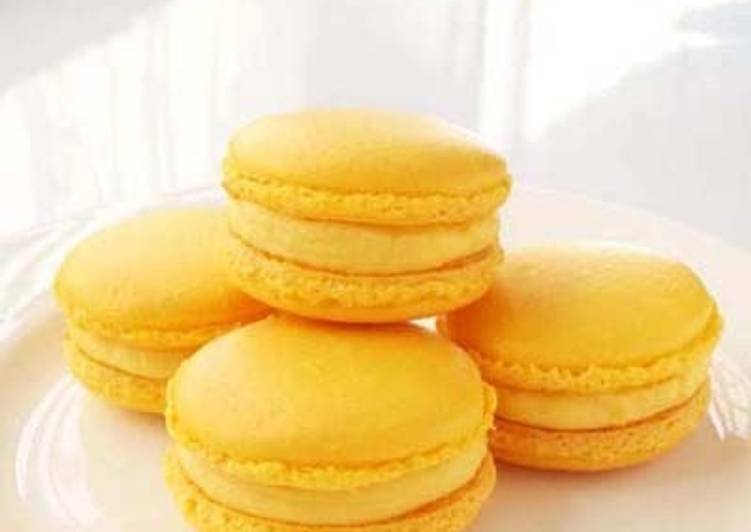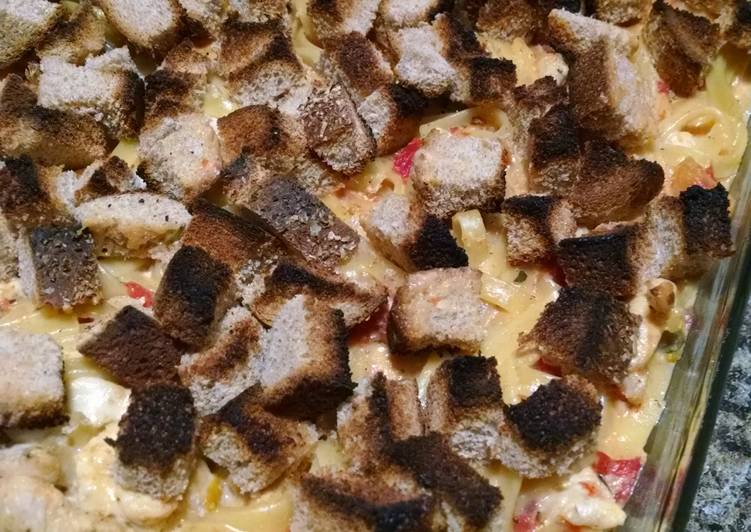
Hello everybody, hope you are having an incredible day today. Today, we’re going to make a special dish, lemon macarons with italian meringue. One of my favorites. For mine, I will make it a little bit tasty. This will be really delicious.
Lemon Macarons are easier to make than you think! The best part is that once you master this recipe, you can bake so many different varieties. Italian - where hot sugar syrup is pour onto stiffly beaten egg whites to create a cooked meringue.
Lemon Macarons with Italian Meringue is one of the most popular of recent trending foods on earth. It is appreciated by millions daily. It’s easy, it’s quick, it tastes yummy. Lemon Macarons with Italian Meringue is something that I have loved my whole life. They are fine and they look fantastic.
To get started with this recipe, we must prepare a few ingredients. You can cook lemon macarons with italian meringue using 7 ingredients and 44 steps. Here is how you can achieve it.
The ingredients needed to make Lemon Macarons with Italian Meringue:
- Take 64 grams Almond flour
- Get 60 grams Powdered sugar
- Make ready 22 grams Egg white ①
- Take 1 Yellow food coloring (lemon yellow & golden yellow or egg yellow)
- Prepare 60 grams ★Granulated sugar
- Make ready 15 ml ★Water
- Prepare 22 grams Egg white ②
Today you'll learn all about the Basic Macarons using the Italian Meringue method and what makes the two methods differ from each other. A: Macarons made using Italian meringue do have smaller feet than those made with French meringue, certainly less "ruffly", and they do shrink on cooling. If they are deflating completely it could be the baking temperature. If they cook too fast they won't have the strength to stay up.
Steps to make Lemon Macarons with Italian Meringue:
- Prepare the Lemon curdthe day before. Add 20 g of almond powder (not listed in the ingredients list) on the next day, and mix in advance.
- If the almond flour is humid or damp, sift it and put in a 250°F/120°C oven for about 2 to 3 minutes until it is dry.
- Use a 4 cm diameter round mold and draw 24 rounds on a parchment paper. (This will be the guide when squeezing out the batter.)
- Line a baking sheet with the parchment paper from Step 3 and place another parchment paper over it.
- Prepare a whisk, piping bag with a round tip (1 cm), thermometer and other tools you need. (Be prepared so that you can work fast.)
- Measure all ingredients precisely and be prepared. Bring the egg white to room temperature.
- Combine almond flour and powdered sugar together, put them in a blender and pulse 10 times. (This is to make the rough powder fine. Pulsing too much will bring out the oil from the ingredients, so be careful.)
- Sift the powder from Step 7 twice using a rough sieve. (You will not be able to sift the almond flour if the sieve is too fine.) Remove any rough powder.
- Add 3-5 drops of lemon yellow food coloring and 1-2 drops of egg yellow food coloring to egg white① and mix. (Let the color be a little bit deeper than your desired color.)
- Put the almond flour and powdered sugar mixture into a bowl, and add the egg white from Step 9. (Just pour the egg white in and don't mix at this point.)
- Set a rack in the middle of the oven. Place another rack above with an empty baking sheet (to prevent browning), and preheat the oven to 350°F/180°C.
- Put the ★ water and granulated sugar in a small pan, and heat up over medium heat.
- When the temperature of the syrup from Step 12 becomes 230°F/110°C, start whisking egg white ② on high speed. (Whip up well until soft peak forms)
- When the syrup temperature becomes 240°F/115°C, pour the syrup into the bowl with egg white little at a time. (Keep whipping the egg white on low speed while adding.)
- After adding the syrup, continue whipping the egg white on high speed, until the egg white temperature becomes 122°F/50°C. The Italian meringue is ready.
- Put 1/3 of the meringue into the bowl from Step 10 and mix well quickly using a spatula.
- Mix well like pressing the spatula to the bottom of the bowl. (This is to melt the powdered sugar completely with the warm meringue.)
- Add the rest of the meringue and scoop up the mixture with the spatula from the bottom of the bowl to make the macaronage. (Gently mix while rotating the bowl.)
- When the mixture becomes shiny and the batter drips from the spatula like a ribbon, the batter is ready.
- Pour the batter into the piping bag.
- Squeeze out the batter into 24 rounds of 4 cm in diameter. (The batter will spread out after squeezing. The point here is to squeeze out the batter to be a little bit smaller.
- Tap the baking sheet on the working board twice to eliminate air pockets, and poke small bubbles using a tooth pick. (If you don't eliminate air pockets, it might break or lose the shape.)
- Remove the lower parchment paper with the round drawing, and let the batter dry for about 30 minutes. (Leave the batter to dry a little longer when making this on a humid day.
- Touch the surface of the batter, and if the batter does not stick to your finger, it is ready to bake. If you don't let the batter dry well, the surface might crack.
- Bake in a 350°F/180°C oven for 12 minutes. Open the oven after baking for 5 minutes and 8 minutes to release humidity. (Turn around the baking sheet on the way while baking.)
- When you touch the side of the shell and it feels hard, and the shell does not stick to the parchment paper when removed from the paper, then it is ready.
- After removing the shells from the oven, pour 1 teaspoon of water under each corner of the parchment paper. (The steam will allow you to easily remove the parchment paper from the cooking sheet.)
- Remove the parchment paper from the baking sheet quickly, with the shells still attached, onto a table or a counter. (The shells will continue to bake if you keep them on the baking sheet.)
- When the shells cool down, remove them from the parchment paper and transfer them onto a rack to cool completely. (Turn over half of the shells before squeezing on the filling.)
- Squeeze out the lemon curd from Step 1 onto 12 pieces of the shells. Squeeze out plenty of filling!
- Place the remaining shells on and then they are ready. If you store them in a air tight container and keep them in the refrigerator they'll be good to enjoy for about 3 days. Bring them to room temperature before eating.
- This is a cross-section of the macaron. If you're careful with the temperature of the oven you won't get any air pockets and the shells should rise quite nicely.
- If you let them sit in the refrigerator for 2 days, the shell will become moist and soft, and the lemon flavor will become more soft and mild.
- You can store the lemon curdin the refrigerator if you have any leftover.
- To store the macarons long: Wrap each macaron in plastic wrap, store them in a air tight container or zip bag and store in the freezer. (You can store them for few months.)
- Put egg white in a container, cover with a plastic wrap, poke some holes in the plastic wrap and let it sit in the refrigerator for 1-2 weeks before using for best results.
- I put 2-3 egg whites each in a container, wrapped tightly with plastic wrap and aluminum foil and stored them in the freezer. Transfer them to the refrigerator few days before making this recipe.
- Try to use powdered sugar which does not include cornstarch. If you don't have any, put granulated sugar through a blender and make it into powdered sugar. (To be continued.→)
- When making powdered sugar from granulated sugar, continue blending until the texture becomes fluffy beyond becoming fine. (To be continued.→)
- Make sure not to blend for too long at one time, because this will be a burden on the motor. Use the blender while pausing between each blending. (To be continued.→)
- If the granulated sugar hasn't been properly made into powdered, the shell cracks like in the picture, so be careful!
- I have increased the amount of almond flour from the original recipe by 4 g. (This refers to the process of removing the rough powder when sifting.)
- When making this on a humid day, use a dehumidifier in the kitchen and keep the humidity level to be about 35%, then this will be easier to make.
- This recipe works best with an American type gas oven, so adjust the humidity and baking time when using a Japanese electric type oven.
The name for the two different methods is derived from the meringue it utilizes - French or Italian. As you may know already, the making of a. Italian Macarons Italian Meringue French Macaroons Italian Cookies Italian Desserts Italian Pastries French Pastries Cookie Recipes Dessert Pierre Herme Lemon French Macaron Pierre Herme: Violet Macaron with Lemon Filling Like you, I love Valentine's Day. The Italian meringue is ready for macarons when it forms a soft peak usually called "bec d'oiseau" ("bird's beak"). Recipe: Pistachio macarons (with Italian meringue).
So that is going to wrap this up with this exceptional food lemon macarons with italian meringue recipe. Thank you very much for reading. I am sure that you will make this at home. There’s gonna be more interesting food in home recipes coming up. Remember to save this page on your browser, and share it to your loved ones, friends and colleague. Thanks again for reading. Go on get cooking!

